ALERT : Do you have coronavirus symptoms? If you are experiencing symptoms of or may have been exposed to COVID-19, contact your primary care doctor, an urgent care clinic, or your local health care center. Do not show up unannounced at an emergency room or health care facility. Watch for symptoms
COVID-19 SAFETY TIPS AND GUIDELINES
Your county government understands the global community is naturally feeling concern and worry as we face the physical health threat of COVID-19 coronavirus. While it is important to stay informed, it’s essential that we maintain perspective and support each other as much as possible during the coronavirus outbreak.
We are all in this together and need to continually contribute to the sense of community wellbeing. The coronavirus has caused widespread panic and it’s best to stay calm, practice mindfulness, be kind to one another and follow official advice, particularly around observing good hygiene habits.
It is reassuring to know there are teams around the world working non-stop to find the fix, or at least reduce the impact of coronavirus through vaccine development and medical professionals helping with local communities every day. Let’s turn this into a positive to help grow our communities both locally and globally together.
Keep a healthy and regular routine
Make sure you follow your regular sleep routine, healthy diet and exercise schedule (if you enjoy it). Putting together a to-do list can also help bring more control and keep you active physically and mentally.
Keep connected
Even though we may not be able to catch-up with friends and family the same way, it is easy to stay connected. There are lots of platforms like Facebook Messenger, Skype and WhatsApp that let you make free phone calls when connected to WIFI. An email or text message can go a long way too. Make the time to connect with your loved ones and ask them “are you ok?” regularly.
Manage your mental health and seek support
It’s normal to feel overwhelmed or uneasy during this time. There are resources and services readily available to you to go through any worries and concerns you have.
Older adults and people who have severe underlying medical conditions like heart or lung disease or diabetes seem to be at higher risk for developing more serious complications from COVID-19 illness. More information on Are you at higher risk for serious illness?
Know How it Spreads
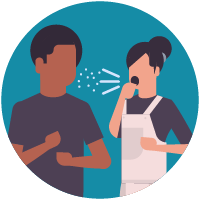
- There is currently no vaccine to prevent coronavirus disease 2019 (COVID-19).
- The best way to prevent illness is to avoid being exposed to this virus.
- The virus is thought to spread mainly from person-to-person: Between people who are in close contact with one another (within about 6 feet), Through respiratory droplets produced when an infected person coughs or sneezes.
- These droplets can land in the mouths or noses of people who are nearby or possibly be inhaled into the lungs.
Take Steps to Protect Yourself
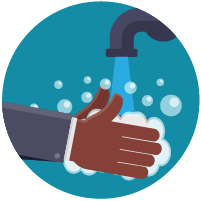
Clean Your Hands Often
- Wash your hands often with soap and water for at least 20 seconds especially after you have been in a public place, or after blowing your nose, coughing, or sneezing.
- If soap and water are not readily available, use a hand sanitizer that contains at least 60% alcohol. Cover all surfaces of your hands and rub them together until they feel dry.
- Avoid touching your eyes, nose, and mouth with unwashed hands.

Avoid Close Contact
- Avoid close contact with people who are sick
- Put distance between yourself and other people if COVID-19 is spreading in your community. This is especially important for people who are at higher risk of getting very sick.
Take Steps to Protect Others
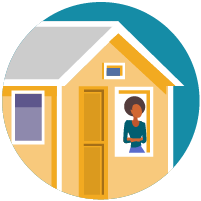
Stay at Home
- The Governor of Georgia has issued a shelter in place order for all Georgia residents. This means stay at home except for esential trips for food, medical care, medicine, fuel, banking or essential government services.
- Stay home if you are sick, except to get medical care. Learn what to do if you are sick.
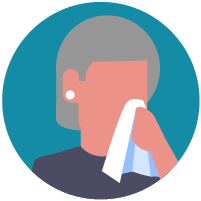
Cover Coughs and Sneezes
- Cover your mouth and nose with a tissue when you cough or sneeze or use the inside of your elbow.
- Throw used tissues in the trash.
- Immediately wash your hands with soap and water for at least 20 seconds. If soap and water are not readily available, clean your hands with a hand sanitizer that contains at least 60% alcohol.
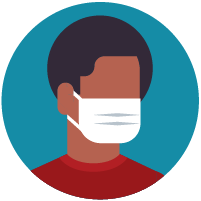
Wear a Facemask
- If you are sick: You should wear a facemask when you are around other people (e.g., sharing a room or vehicle) and before you enter a healthcare provider’s office. If you are not able to wear a facemask (for example, due to difficulty breathing ), then you should cover your coughs and sneezes. Those caring for you should wear a facemask. Learn what to do if you are sick.
- If you are NOT sick: COVID-19 can spread to others even if you do not feel sick. Cloth face covers are meant to protect other people in case you are infected.
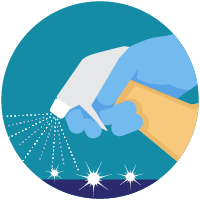
Clean and Disinfect
- Clean AND disinfect frequently touched surfaces daily. This includes tables, doorknobs, light switches, countertops, handles, desks, phones, keyboards, toilets, faucets, and sinks.
- If surfaces are dirty, clean them: Use detergent or soap and water prior to disinfection.
Guidelines for Disinfecting
Most common EPA-registered household disinfectants will work. Use disinfectants appropriate for the surface.
Options include:
- Diluting your household bleach.
To make a bleach solution, mix:- 5 tablespoons (1/3rd cup) bleach per gallon of water
OR - 4 teaspoons bleach per quart of water
Follow manufacturer’s instructions for application and proper ventilation. Check to ensure the product is not past its expiration date. Never mix household bleach with ammonia or any other cleanser. Unexpired household bleach will be effective against coronaviruses when properly diluted.
- 5 tablespoons (1/3rd cup) bleach per gallon of water
- Alcohol solutions.
Ensure solution has at least 70% alcohol. - Other common EPA-registered household disinfectants.
Products with EPA-approved emerging viral pathogens pdf icon[7 pages]external icon claims are expected to be effective against COVID-19 based on data for harder to kill viruses. Follow the manufacturer’s instructions for all cleaning and disinfection products (e.g., concentration, application method and contact time, etc.).

 Translate Page
Translate Page